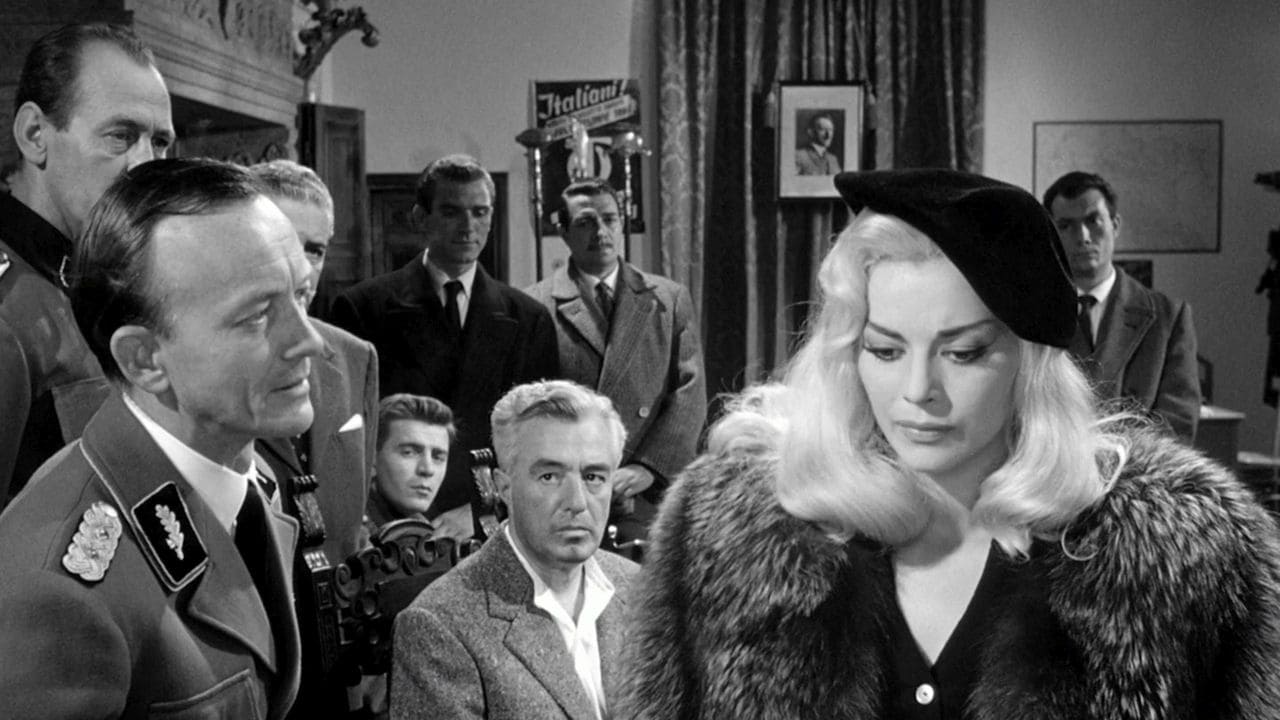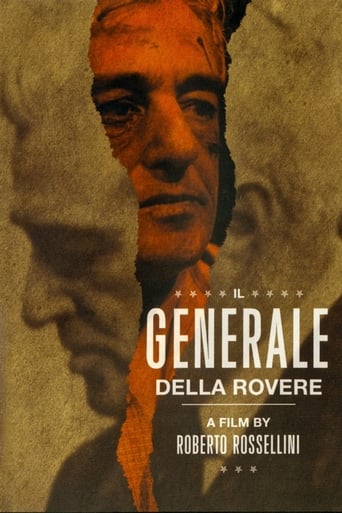

Wonderful character development!
... View MoreGood concept, poorly executed.
... View MoreI like movies that are aware of what they are selling... without [any] greater aspirations than to make people laugh and that's it.
... View MoreInstead, you get a movie that's enjoyable enough, but leaves you feeling like it could have been much, much more.
... View MoreIl Generale Della Rovere was one of Roberto Rossellini's most successful films (winning the Golden Lion at the Venice Film Festival), commercially, and there is a simple reason why. It's not that good a film. It's a rather formulaic film, slathered with faux patriotic sloganeering, whitewashed politics, and a rather banal cinematic approach. Rossellini was, along with the film's star, Vittorio De Sica, one of the two big name directors of what was known as Italian Neo-Realism. But, while 1945's Rome: Open City was also a financial success for Rossellini, he went almost fifteen years between that success and this one, in 1959. De Sica, however, had more commercial and critical success in the interim.The film's plot is supposedly based on real life events that took place in World War Two, after Italy switched sides, leaving the Axis and joining the Allies. However, there has been dispute, among historians, over whether the tale is true or not, and just how much of the tale, if true, is apocryphal, or the result of hagiography, because it was based on a novel by Indro Montanelli. The tale follows the life of a petty conman named Victorio Emanuele Bardone (De Sica), who uses a bunch of assorted aliases (including that of a phony Italian colonel named Grimaldi) to run his assorted scams and schemes, fleecing attractive women (wannabe actresses and prostitutes) and desperate families who are willing to pay him for information on the whereabouts of relatives who have been arrested by the Nazis. The black and white film runs for 2 hours and 13 minutes, and the first 45 or so minutes follows the escapades of Bardone, and watching him gamble and lose, fleece his suckers, and generally act in unethical ways, is the best part of the film. Especially good is watching him interact with a Nazi colonel named Muller (Hannes Messemer), for both men are essentially the same person, phonies who are out to wreak havoc in the world. The one difference is that Muller actually has fangs, and is willing to use them, whereas Bardone lacks the fangs and the will.This is one of those films that I can marginally recommend viewing, if only because it illuminates the better work being done at the same time, like Fellini's La Dolce Vita. On its own, however, Il Generale Della Rovere is vastly overrated and a disappointing film in not only Rossellini's canon, but that of Italian cinema, despite its financial success. Hollywood was not alone in this regard. Why it was so critically well regarded, however, is a mystery, since its flaws are apparent. Then, again, never underestimate the power of patriotic screeds, especially when the legend looms larger than the man. Damn, I didn't know Rossellini loved John Ford.
... View MoreI fully agree with all the glowing accolades of other commenters and totally disagree with the one commenter who thought it was "uneven." This is one of the greatest films ever made, partly because the humanity of the characters and the choices they must make are really what life is all about. If only present-day film makers (producers, directors, writers, etc) would concentrate their efforts towards making films of this caliber, what a much better world this would be. Instead, desiring profits over quality, they go for the lowest common denominator, and continue to make films bereft of the poetry of life, and full of gore, violence, guns, explosions, terror, and all sorts of ugliness and gratuitous noise. They think "this is what the public wants." How wrong they are. One interesting aside: I believe that Rosselini wasn't really as satisfied with this film as much as audiences are. If that rumor is true, it can only be an example of an artist not realizing the impact and importance of a particular work they have created.
... View MoreRoberto Rossellini, as a filmmaker, cannot be compared to anyone else. Not because of any camera technique but because his mind, to tell a story, took shortcuts through truly dangerous territories. The nervous center of the Italian human nature is dissected with fierceness, compassion and even a touch of admiration. Redemption coming in the most unexpected form as a last, final test. Who am I, really? Could I at the last moment of my life become the man I always wanted to be? Beautiful, poignant, terrifying. Vittorio De Sica gives one the best performances of his eclectic and extraordinary career. The traveling of his thoughts seem to come out of the screen with the same intensity as his real smallness, his fear, his painful self awareness. Truth, with all is uncomfortable connotations 24 frames a second.
... View MoreWinner of many top international festival prizes, this was one of Roberto Rossellini's most widely seen films in America after OPEN CITY and PAISAN. It is a superbly written, directed, and acted drama about a petty conniver, Bertone, alias Grimaldi, played by Vittorio De Sica in what is possibly his greatest acting role. He is not above loving people and swindling them at the same time. He does this to survive the hard times of Mussolini's Salo' Republic period. The film is set in Genoa after the Badoglio armistice has been signed with the Allies in the south. Bertone tries to help Italians who have relatives imprisoned by the Nazis. Sometimes he can help; other times he cannot but always takes their money. When his game is finally up, he is imprisoned but offered an opportunity by the Germans. He is to impersonate a revered partisan leader already killed by the Nazis in order to furnish them information on another partisan leader in the anti-fascist underground. It is at this point that Bertone gradually undergoes a transformation, choosing patriotism over capitulation. The con-man becomes a hero. Other standout performances here are given by Sandra Milo as a prostitute, Hannes Messemer as the Nazi commandant and Vittorio Caprioli as an inmate barber.
... View More